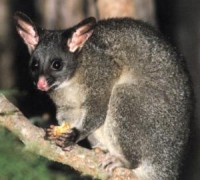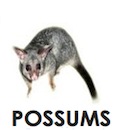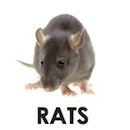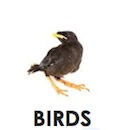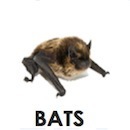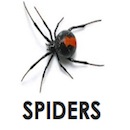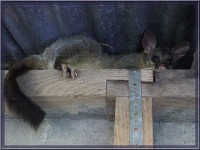How can I tell if there are animals in my roof space and walls?
If you are hearing noises, then you certainly have something residing within your building. Loud heavy footsteps indicate a larger animal such as possum, whilst lighter, faster, currying type sounds and scratching would indicate more the presence of a rodent colony. It is best, however to have your building inspected by a professional before deciding on the treatment as possums are protected by law against harm and baiting can have serious side effects when performed and there is a chance of wildlife presence. You must ensure your building is completely sealed off to possums and other wildlife BEFORE PLACING ANY POISONS within it. Laying baits externally, even if within a “Baiting Station” is dangerous to wildlife, pets & children and should be avoided at all cost. They will also serve to attract rodents to your property that have no previous reason to be there.
Why are the possums in my roof?
Possums are nocturnal animals, meaning that they prefer to eat, wander, breed and play during night time hours. Your home is merely its daytime resting spot and helps to protect the animals whilst they sleep the day away.
Am I harming the animals by getting them removed?
Not if you use a licensed animal removal specialist like PestWS. Our tried and tested methods closely resemble the possums own natural habits of retaining their territories ….but without the fight. Possums will fight sometimes to the death to retain their “HOME” which is sometimes our homes, so by carefully sealing and allowing the animals to leave on their own accord and then having no way back in the next morning he or she will simply feel defeated and hopefully move on, just as it would if another possum claimed the house…completely natural. Please ensure your company of choice uses a similar style for the possums sake and for your sake, as improper sealing techniques will eventually allow the animals to re enter.
Can you remove and “RELOCATE” a possum?
NO, as possums are extremely territorial and research has proven that if they are released elsewhere, other than the area they are trapped in, they will barely survive a week. The local possums will not tolerate intruders. It is also illegal and carries very hefty fines for landowners. Also, if you do not have your building properly sealed, then another possum will just move straight back in and you will be back at square 1!
Are resident possums damaging to my home?
Not usually….they may chew a small entry point occasionally and very small holes into gyprock walls if uncomfortable at their resting point, and have a pungent urine that is used to mark territories that can stain, but other than this on quite rare occasions, we do not see any major damage caused by possums in the course of our work.
Can I treat RATS myself?
Yes you can, however, rats are very intelligent animals, and at least 1kg of high quality bait is required to eliminate and prevent new rats from re starting the colony up again. Regular re treatments are recommended to keep your property RAT free. You will need to hope that your resident rats have not seen your chosen baits prior or they will not touch it again. We would recommend that the initial treatment be carried out by animal professionals like PestWS, and then attempt to prevent colony’s reforming with D.I.Y treatments at regular intervals, or again just leave it to us, the PROS, to keep them at bay.
Are rats damaging to my home?
YES…rats are notorious gnawer’s. They chew materials constantly in order to keep their incisor’s, which are constantly growing, at an optimal length. So in actual fact, the “SCRATCHING” that many clients hear in the walls and roof is actually the rats gnawing on the frame or structure of your home. Some even find the insulation and copper wire within your electrical circuits very useful and irresistible for wearing down their teeth. In some instances they have even started house fires by shorting out mains power and starting the fire. This has been extremely reduced with the introduction of “SAFETY SWITCHES” to homes, but now results in the cables being chewed more as the circuits just break and turn off without harming the animal, so it just keeps chewing. This results in power, and in particular, lighting issues within your home.
Can we trap or lock out rats from our home?
Put simply…No. Rats are very tenacious animals with very high intelligence. They will simply find a new entry point or points, and if none are available they will just chew themselves a new one. This is the cause of damage that you should try to avoid. Rats are an introduced animal to Australia. They are feral and in extremely large numbers, especially when close to fresh underground water such as a sediment pit, (which on most occasions you don’t know is even there, the rats do however) and thrive at these locations. Rats are by far the most prolific of introduced animals in Australia, by population and effect, the native wildlife and fauna suffer significantly as a result.
Is my families or my health at risk from living with the animals?
Not directly, however, both rats and possums carry parasites such as fleas, ticks & bird lice. Rats are well-known carriers of over 70 diseases, most of which are transferred through the urine and faeces or parasite bites i.e. fleas, ticks. Whilst serious illness from animals is rare, some of the listed issues & diseases that rats in particular are known to cause or carry and transfer range from annoying (I.E. sleep interruption) to very harmful and in some instances FATAL to humans (i.e. leptospirosis which has an approximate death rate of 50% in humans).
What do I do if I see a rat in my yard?
Do not kill or touch it. Please take the time to look up the Australian native animal called “BANDICOOT”. These animals are unlucky enough to look exactly like a rat….including the tail. There are differences however and 9 times out of 10 this is what you are looking at in the yard. The head shape is more “pointed” and the ears are slightly rounder, and the bandicoot has a more ferocious mouth full of teeth, which will be evident when you approach them as they will open up to show you in defence, than the rat which have 2 large in-scissors top and bottom and will more than likely put up the front paw or paws in defence. Rats are very cautious about their safety and you are unlikely to see a healthy rat out in the open as it would be gone long before you get to where it is, so please look out for BANDICOOTS. A tell-tale sign for their presence in an area (your yard) is conical holes about the size of a ten cent piece, very evident under buildings especially, in the dirt or ground as a result of their hunting for bugs,worms,etc. These animals cannot climb and offer no adverse effects on your home….so please look out for them at all times.
